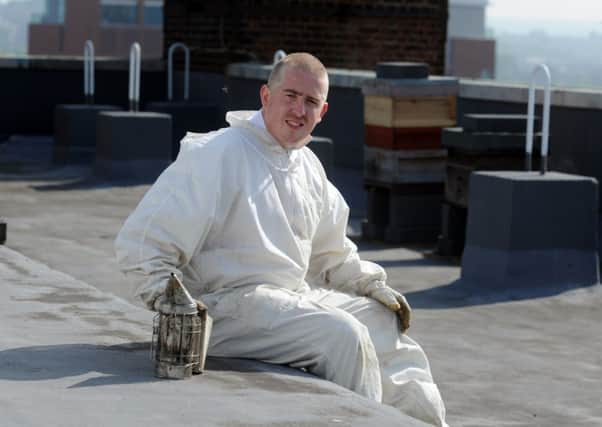How the wet weather turned bees into a hive of industry


It’s been a long time coming, but finally seems there may be some good news for bees.
Two years ago local bee populations were in decline, but despite the recent – and ongoing – wet weather, bee numbers are on the up. When (and if) it does stop raining, 2014 could be the year bees stage a comeback.
Advertisement
Hide AdAdvertisement
Hide AdChris Barlow, 38, an IT trainer from Leeds who has been beekeeping for the last four years, said: “The bees at Temple Newsam are doing great, we check them throughout the winter to make sure they have enough food and we have just treated them for varroa mite so that when they do start to build up their numbers, the colonies will be as healthy as possible.
“Bees had a bad year in 2012 because there was a lot of rain in the summer. This is not something bees here are used to. Over tens of thousands of years they have evolved to collect food in the summer and remain in the hive over winter.
“Rain and wet weather in the winter doesn’t bother them too much, because it’s what they’re used to.
“We expect them to remain in the cluster over winter but come April time, when the weather begins to pick up, we will see them coming out. During winter there might be around 10,000 bees in a hive but in the summer it could be anything up to 90,000.
Advertisement
Hide AdAdvertisement
Hide Ad“They can fly anything up to three miles from the hive and find their way back but most of the time they don’t go more than about a mile. We know they do something called a ‘waggle dance’ to communicate to fellow bees the location of good food sources but quite how they manage to find their way back to the hive every time is still unknown.
“One of the main dangers over winter is a hive blowing over in the wind or being hit by a falling tree or being damaged by vandals or a wild animal. I had one hive fall over and I won’t know until the summer whether the colony has been damaged.”
He added: “Bees are just like me and you in many respects – they need somewhere nice and warm to stay and food to eat – the difference being they don’t have a Tesco down the road. Effectively, they collect and make their own food.”
Duncan Brearley is the Leeds Beekeepers Association spokesman and swarm co-ordinator for Leeds. He has kept bees for years and has been stung more times than he cares to remember. He explained why the present spell of wet weather, far from being a hindrance to bees, was doing them good.
Advertisement
Hide AdAdvertisement
Hide Ad“We have some good news at last. This winter is, so far, proving to be ideal for our native honeybees. Beekeepers reported that their bees produced above-average honey crops last summer. That meant they had plenty of rich, lovely honey left on the hives to eat during the winter months (with plenty left over for beekeepers to bottle).
“You might have thought that the wet and cold weather we have endured would not have suited the bees. But far from it. This weather simply means they stay at home in the hive, contentedly hunkered down, waiting for better times.
“And it hasn’t all been cold and wet. There have, apparently, been just the right amount of warmer days that have allowed the bees to come out for a fly around to stretch their wings too.
“The queen bee, the honeybee’s leader, will by now have sensed the days are getting longer and she will have started laying eggs already in preparation for the season to come.
Advertisement
Hide AdAdvertisement
Hide Ad“Worker bees, on the warmer days, will be out looking for early pollen to feed these new and developing bees.
“You may have noticed some early Pussy Willow catkins and snowdrops are out already and surely the crocuses will not be far behind? Bees love all these plants.
“Beekeepers report that all the colonies in their teaching apiary in the Temple Newsam estate are thriving. These bees have been specifically selected for their gentle temperament, making them ideally suited for beginners to learn this ancient craft.”
Mr Brearley added: “The bees, like us, are already looking forward to warmer times that are surely now just around the corner?”
Here’s hoping.
Advertisement
Hide AdAdvertisement
Hide AdMr Brearley said there was already significant interest in their evening course for beginners, on Wednesday May 7.
During the summer months the club also has an observation hive, with a glass side, allowing people to see the colony at work.
For more information on courses and advice on what to do if you find bees on your property, visit: www.leedsbeekeepers.org.uk.